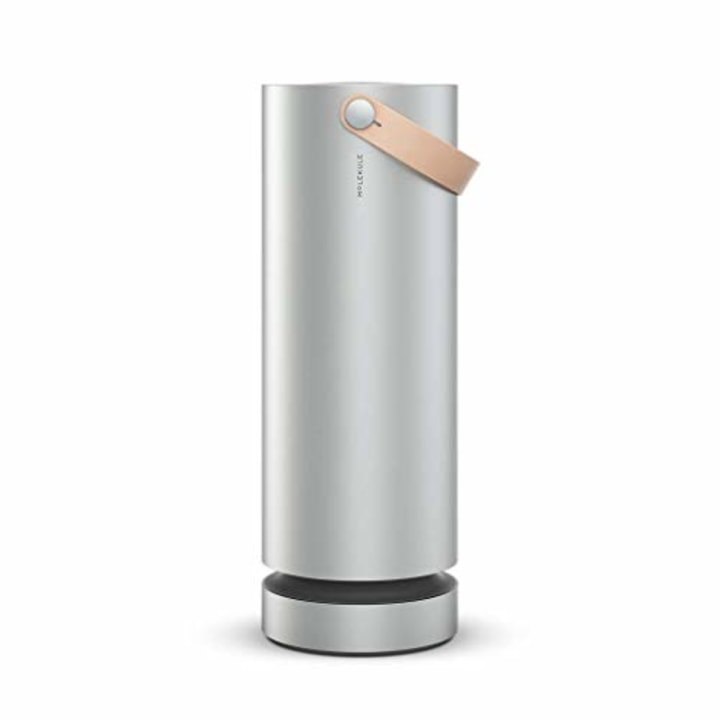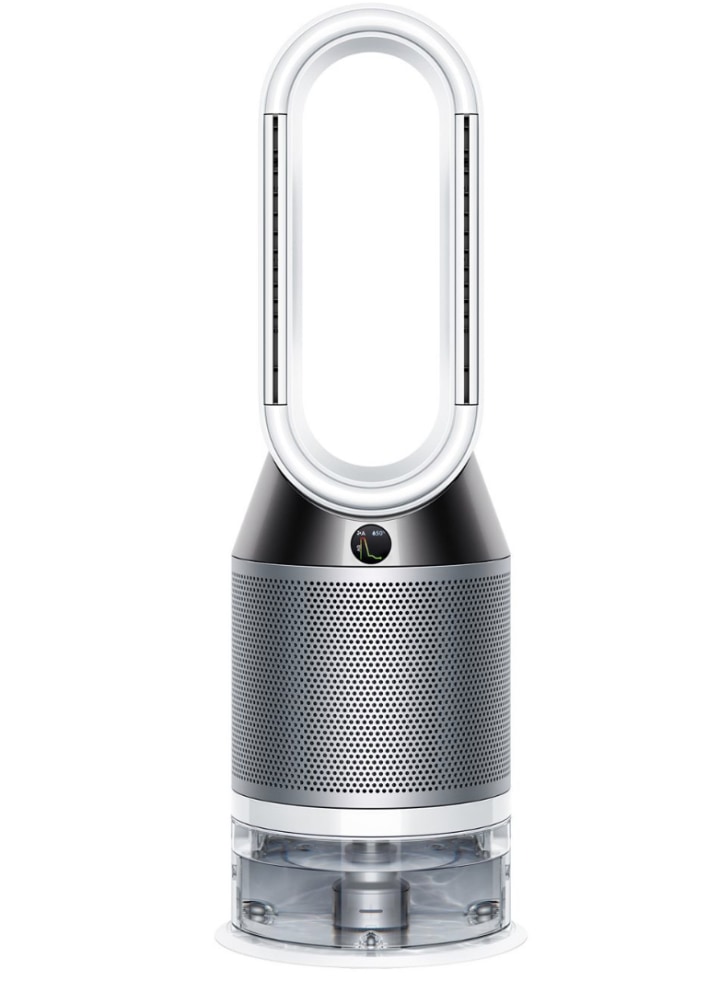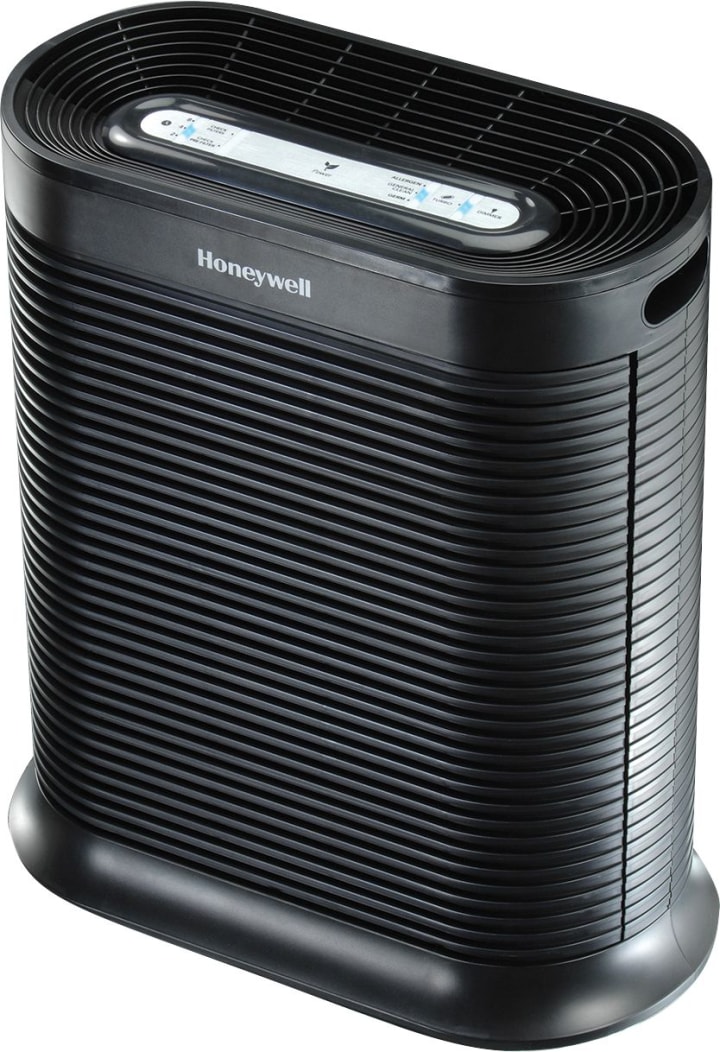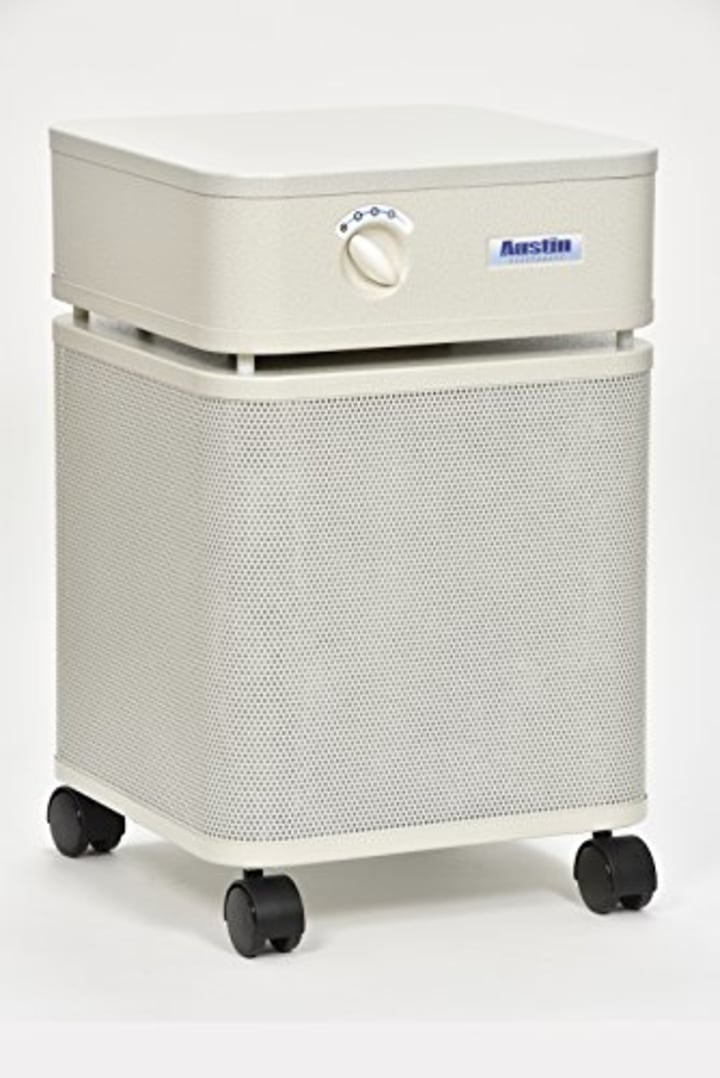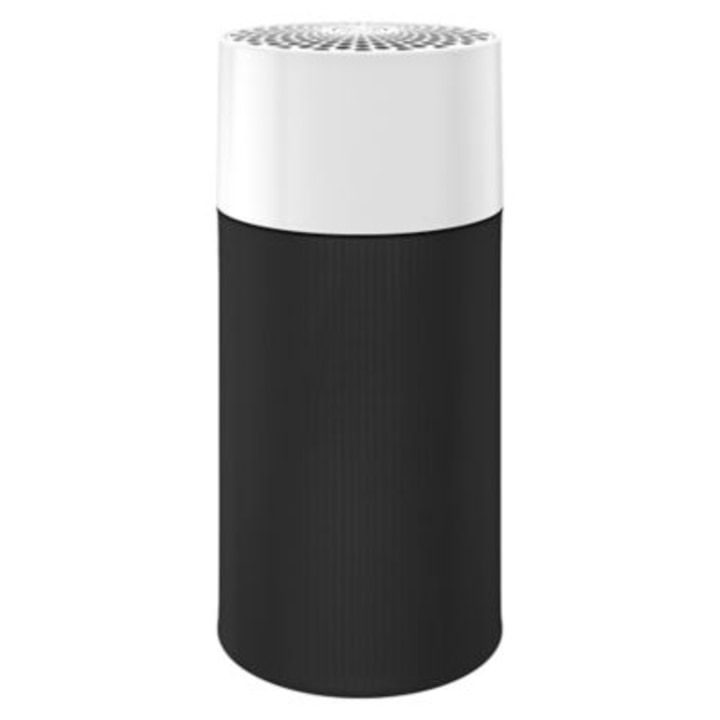How do air purifiers work?
Air purifiers are designed to remove indoor air pollution which can be made up of small particles in the air. Indoor air pollution primarily comes from cooking, automobile emissions, dust and fires, and can irritate the lungs or trigger allergic reactions, explained Kenneth Mendez, president of the nonprofit Asthma and Allergy Foundation of America. And according to the Environmental Protection Agency, the air inside our homes can be more polluted than the air outside.
“We take about 20,000 breaths each day and spend 90 percent of our time indoors,” Mendez noted. “Now that we are in a global pandemic and with some areas enacting a ‘shelter-in-place,’ this rate of staying indoors has increased.” Reducing exposure to particles that can trigger things like allergies and asthma symptoms is important. “If you live in an area with high outdoor pollution, like a metropolitan city, it’s essential to monitor the air quality in your home,” he added.
Do air purifiers prevent coronavirus? No.
Air purifiers do not prevent the spread of coronavirus. While there is growing evidence that the virus can be transmitted through the air, the CDC reports that coronavirus is primarily spread through person-to-person contact or contact with contaminated surfaces and objects. Filtering airborne particles wouldn’t help stop the spread of the virus, given the small size of coronavirus particles, explained Nidhy Varghese, MD, a pediatric pulmonologist in Texas. The average size of a coronavirus particle is less than the 0.3 micron limit for HEPA filters, she added.
“So even if these microbes make it into the purifier, they may elude filtration,” Varghese said. “The data so far suggests that it is unlikely that air purifiers will help with coronaviruses. Ultimately, the decision to purchase a sanitizing air purifier is a personal decision.”
The difference between air purifiers, air cleaners and air filters
Air purifiers are often conflated with air filters, but they differ slightly, said John McKeon, MD and CEO of Allergy Standards — an organization that certifies products as “asthmas and allergy friendly,” among other things.
- Air filters trap and collect dirt and debris in a filter, and are commonly found in heating and ventilation systems. They can significantly reduce the amount of pollutants, allergens and dust in your home.
- Air cleaners remove more particulate from the air than the average filter, said McKeon. The device consists of a fan to draw air in and a filter to remove particulate from that air. While air cleaners often include filters, they are overall more robust in cleaning the air than air filters. Regardless, most companies will use the terms air cleaner and air purifier interchangeably.
- Air purifiers use a process to “deactivate” airborne toxins like pathogens, McKeon explained. Some purifiers use ultraviolet light sterilization to kill mold and bacteria while others use an electrostatic filter to draw particles to metal plates. Most air purifiers rely on a combination to trap as many particles, gases and bacteria as possible.
What is a HEPA filter?
You’ve likely seen this designation on air purifiers and other products before. HEPA stands for “high efficiency particulate air.” HEPA filters are physical filters designed to clear out at least 99.7 percent of particulates that are 0.3 microns or larger in size. For reference, a micron, or micrometer, is about one twenty-five thousandth of an inch and designated with an μm.
Any air cleaner that has a HEPA filter has been tested and approved by the nonprofit Institute of Environmental Sciences and Technology. This means they are true HEPA. Some filters will label themselves as “HEPA-type” or “HEPA-like,” but these filters are not verified HEPA so may not be as effective. True HEPA filters draw particles in via a fan and trap them in a web of fibers. They perform better than standard filters and have become increasingly popular, says Varghese.
Molekule’s air filters are different from HEPA filters. Regular HEPA air purifiers target airborne particles in the air. Molekule’s filter uses its own patented filter technology: photo electrochemical oxidation (PECO). According to Molekule’s, PECO uses free radicals, or highly reactive atoms, to break down pollutants at the molecular level. PECO filters remove and deactivate common gases, bacteria, viruses and mold in the air, according to the brand. It’s important to note that both Consumer Reports and the National Advertising Review Board have disputed some of Molekule’s filtration claims, specifically about their filter’s superiority to HEPA filters.
Benefits of air purifiers
While air purifiers can’t protect you from coronavirus, there are still plenty of benefits to having one in your home. If you already experience irritation from dust or allergens, or have asthma, allergies or other respiratory conditions, it may be smart to invest in an air purifier, says Josh Davidson, MD, an allergy and immunology specialist in California.
Let our news meet your inbox. The news and stories that matters, delivered weekday mornings.
“We are all trying to do what we can right now. It’s one of those factors that can only help, given everything that’s happening,” he said. “Don’t run out and buy air purifiers in mass and hoard them like toilet paper, but consider it, especially if you are at higher risk.”
Above all else, the best way to prevent the spread of coronavirus is by washing your hands regularly, cleaning and disinfecting regularly-touched surfaces and avoiding other people, especially those who have been sick.
How to find the best air purifier for you
Before buying an air purifier, narrow down your specific needs, advised Varghese. For example, maybe you’re looking for a purifier for allergies or to protect you against gases. Or maybe you cook frequently and want a purifier to filter out particles produced from your oven and stove.
Varghese recommends seeking a purifier with a HEPA filter for the best results. It’s equally important to find a filter that’s been independently rated by the Association of Home Appliance Manufacturers, she said. All air cleaners certified by the AHAM and given a clean air delivery rating, or CADR, have been tested in an independent laboratory and across the same metrics.
“We put all products on a level playing field regardless of technology, so consumers can easily compare between products,” said Jill Notini, vice president of communications and marketing for AHAM. “We test for things like tobacco smoke, dust and pollen.”
The higher the CADR rating, the more effective and faster the air cleaner is at filtering the air. Notini advises shoppers to pay attention to the rating when shopping. Davidson also encourages shoppers to pay attention to how often the air purifier will require a replacement air filter and how many square feet the air purifier can clean.
Some air cleaners use electrostatic charges and generate a small amount of ozone as a byproduct, said Mendez. Ozone is very reactive and is effective for removing odors and killing mold. But it can also “can cause health problems at high concentrations,” according to the EPA, which notes that ozone generators are often billed as air cleaners. Selecting an independently-rated air purifier will ensure your air cleaner produces less than the EPA-designated ozone limit of 0.08 parts per million. “By using an independent agency like ours, you can make sure you’re getting the right product,” said Notini.
The best air purifiers to shop in 2020
To give you an idea of what’s out there, here are some of the leading and most popular air purifiers. You can find thier cleaning capacities and whether they equip HEPA filters or have been approved by AHAM.
1. Molekule Air
- Cleaning capacity: 600 square feet
- AHAM approved: No
- HEPA filter-equipped: No
The Molekule Air has a sleek design and includes two filters, designed to capture pollutants smaller than the average air purifier using PECO technology. Though the Molekule is more expensive than other air purifiers, it boasts hundreds of positive reviews.
2. Dyson Pure Humidify + Cool
- Cleaning capacity: 400 square feet
- AHAM approved: No
- HEPA filter-equipped: Yes
This recently-released model is an air purifier, humidifier and fan, all in one. The Dyson Pure Humidify + Cool boasts a sleek design and plenty of bells and whistles, including a space heater, sleep timer, Wi-Fi connection, Alexa compatibility and nighttime mode. It also has a HEPA filter and is one of the only models that allows for oscillation. While pricier than other models, the Dyson may be best for shoppers looking for extra features.
3. Honeywell True HEPA Air Purifier
- Cleaning capacity: 465 square feet
- AHAM approved: Yes
- HEPA filter-equipped: Yes
This model is made for larger rooms, and has a true HEPA filter. Honeywell claims this purifier filters and circulates air up to five times an hour. This model is relatively affordable given its size, and comes with features like a timer setting, filter change indicator. It has two filters: a pre-filter to capture large particles like pet hair and lint, and a HEPA filter for smaller particles.
4. Austin Air Healthmate Standard Air Purifier
- Cleaning capacity: 1500 square feet
- AHAM approved: No
- HEPA filter-equipped: Yes
This model offers a four-stage filter, which includes a HEPA filter, with a 60-square-foot radius. It uniquely has four filters, removing a different type of particle at each one. This includes a large particle pre-filter for dust and dander, a medium pre-filter for mold, a carbon filter for chemicals and gases and a HEPA filter for smaller particles. This model is much larger and heavier than others — it weighs 45 pounds — but includes rollers for easier transportation.
5. Blueair Blue Pure 411 Air Purifier
- Cleaning capacity: 161 square feet
- AHAM approved: Yes
- HEPA filter-equipped: No
The Blueair Pure 411 is one of the best budget air purifiers out there, though it only purifies smaller spaces. This model is great to have in your home office or living room (which you are likely spending more time in thanks to social distancing). The purifier is compact and comes in different colors to match your room’s decor. This model comes with their own HEPASilent technology (which is not the same as an approved, true HEPA filter) and a CADR rating. Besides being affordable, the Pure 411 has low-cost replacement filters and is more energy efficient than other models.
Tips for maintaining good air quality
Outside of buying an air purifier, there are some good home habits that you can adopt to help reduce the amount of air pollution in your space.
- If you can, open your windows for a period of time every day.
- Otherwise, make sure your heating or air conditioning system is running regularly to circulate air throughout your home, said McKeon.
- If you cook regularly, make use of your exhaust fans.
“With the focus on COVID-19, it is easy for existing health issues to fall out of focus,” McKeon added. “Triggers in the indoor environment have not gone away, so make sure you are reducing triggers where possible.”
More shopping guides and recommendations
- Most purchased cleaning, tech, fitness and kitchen products
- How to improve remote work with laptop stands
- Best surge protectors and power strips 2020
- Which is the best smart thermostat for you?

